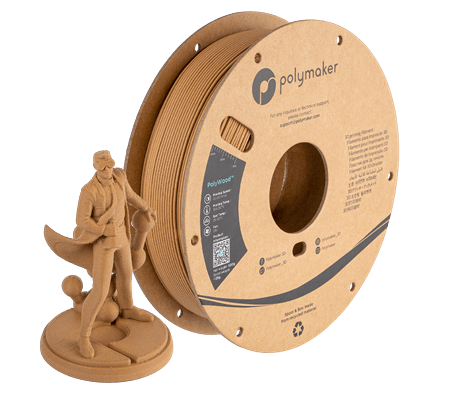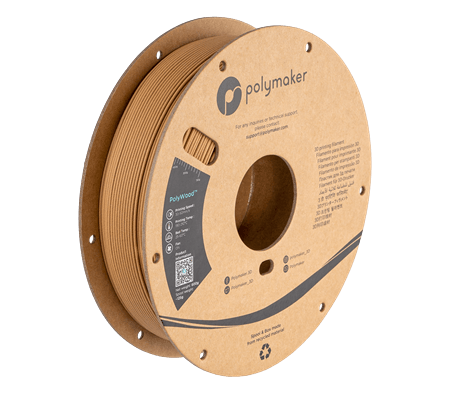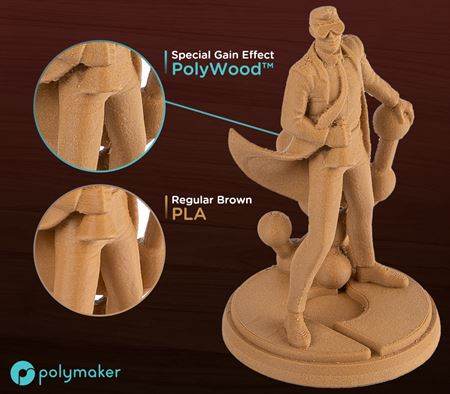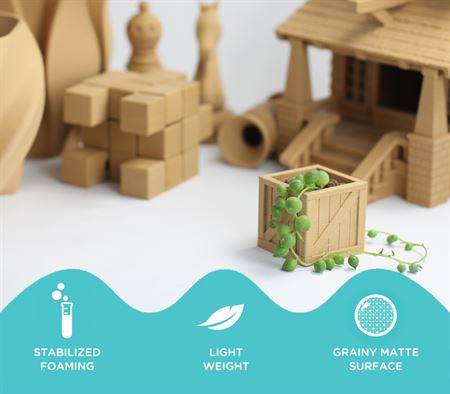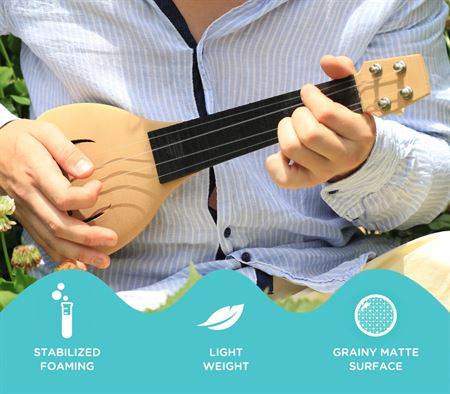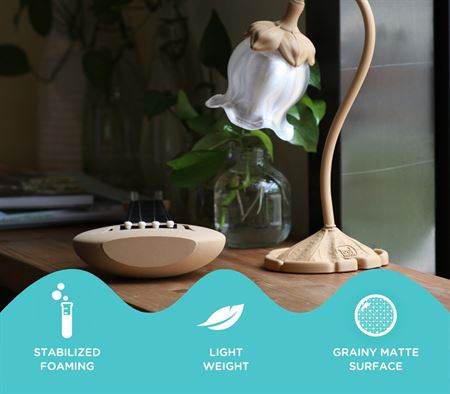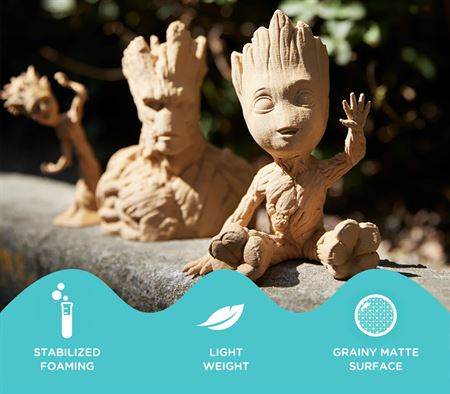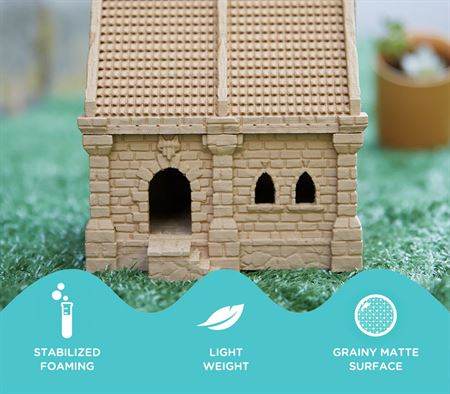Polymaker
PolyMaker PolyWood PLA 600g
PolyMaker PolyWood PLA 600g
Low stock: 2 left
Couldn't load pickup availability
Light-weight wood-mimic filament with no wood composites used! Features Jam-Free™ and Stabilised Foaming™ technology.
- High quality Polymaker wood-mimic foam PLA.
- Grain matte surface finish for wood-mimic models.
- Stabilised foaming produces light weight models.
- Easy-to-print.
- Jam-free™ technology improves compatibility with all-metal hotends.
- Cardboard spool & packaging (made from 100% recycled cardboard)

PolyWood™ is a wood mimic filament without actual wood powder, which removes all risks of nozzle clogs. PolyWood™ is made entirely with PLA using a special foaming technology. It exhibits the same density and appearance as wood.
Features
-
Light Weight - PolyWood™ is a first of its kind light weight foam PLA designed to mimic the weight of real wood! Featuring Polymakers Stabilised Foaming™ technology, PolyWood™ is 35- 40% lighter than regular PLA, only weighing 0.8 g/cm³!
-
Attractive Surface Finish - The Stabilised Foaming™ technology in PolyWood™ delivers an incredible matte surface finish which makes it a unique material choice for aesthetic applications such as architectural models, figurines, gaming dioramas and decoration or lifestyle projects.
-
Wood with no mess - Instead of using wood to mimic wood, Polymaker developed a unique foaming technology to deliver a material that mimics wood structurally. PolyWood™ is composed entirely of polymers. The Results? Excellent print quality without the risk of nozzle jams associated with other wood filaments.
-
Jam-Free™ - Polymaker have implemented their Jam-Free™ technology into PolyWood™ to improve the heat stability of the filament with softening temperatures over 140 °C. As a result, PolyWood™ shows minimal softening in the “cold end” and can melt rapidly once entering the heating zone, leading to excellent printing quality with zero risk of nozzle jams caused by heat creep.
-
Uncompromised Quality - PolyWood™ filament is made with the highest quality ingredients including Ingeo® from Natureworks. Natureworks is a world-leading biopolymers supplier based in the USA with a portfolio of high quality raw PLA materials produced from rapidly renewable plant resources. Combining Polymakers innovative R&D technologies, compounding and extrusion systems with Natureworks Ingeo® resins produces a reliable 3D printing filament to print beautiful and accurate models.
[1] Heat creep is the the process of heat spreading irregularly throughout the hot end, one common example is with all metal hot end designs. Once heat creeps towards the cold end, the PLA filament softens prematurely in the cold end and expands resulting in a jam. Polymakers Jam-Free™ technology increases the heat resistance of the filament itself (not the printed part) to 100˚C which prevents the filament from prematurely softening in the cold end and can still melt rapidly once entering the heating zone.

Wood-like materials are a unique category of 3D printing filaments specifically designed to mimic the look and texture of real wood. PolyWood™ like many other wood mimic filaments uses PLA as it's base material which is one of the most popular base materials due to its low printing requirements and excellent dimensional stability.
PolyWood™ offers some unique differences to other commercially available solutions, specifically designed to solve many problems faced when printing other wood-like filaments..
- Features no real wood particles, delivering a wood mimic material with less clogging and hassles.
- Features Polymakers Stabilised Foaming™ technology which delivers an incredible surface finish and filament which is 35- 40% lighter than regular PLA.
- Features Polymakers Jam-Free™ technology to prevent heat creep related jamming.
- Minimal printing requirements.
- Exhibits excellent dimensional stability for large 3D printing projects.

PolyWood™ features no real wood particles, delivering a wood mimic material with less clogging and hassles.
Unlike commercially available wood-powder based filaments, Polymaker took a unique approach with PolyWood™ to deliver a more user friendly wood mimic filament composed entirely of polymers. Wood powder in other wood-like filaments (often present in large amounts) tends mess up the flow properties of the polymer melt, resulting in poor printing quality. Furthermore poorly dispersed wood powder can even jam the extruder on your printer, which will never happen for PolyWood™.

PolyWood™ is 35- 40% lighter than regular PLA, only weighing 0.8 g/cm³!
PolyWood™ was the first 3D printable foam filament of it's kind, printing with a porous structure which mimics the grainy texture and weight of real wood. This structure enables PolyWood™ to print parts 35- 40% lighter than regular PLA. Polymakers Stabilized Foaming™ technology stabilizes the air bubbles inside the material so you can maintain the porous structure during and after printing.
Whether it be to print wood-mimic architecture models, beautiful household lifestyle projects or even insulation applications which utilize the intrinsic foamy structure, PolyWood™ is a popular choice for hobbyists, professionals and educators thanks to it's unique aesthetic properties, light weight performance and excellent print reliability.

The Stabilised Foaming™ technology in PolyWood™ delivers an incredible matte surface finish.
PLA based filaments are recognized as one of the most beginner friendly materials but with some 3D printers susceptible to heat creep, that reliable experience with PLA isn't shared by everyone. Polymakers Jam-Free™ technology is engineered to provide an easier solution to heat creep by increasing the softening temperature of the filament.

PolyWood™ has minimal warping and shrinking compared to other materials, perfect for applications featuring flat surfaces and hard angles, or requiring tight tolerances for fit.
PolyWood™'s compatibility with specialised support materials, enables users with a dual extrusion 3D printer the ability to 3D print complex structures and geometry. PolyDissolve™ S1 is a dedicated support material engineered for printing water dissolvable supports with perfect interfacing and improved part surface quality. PolyDissolve™ S1 offers excellent compatible with a wide range of material types and Polymaker filaments including PolyWood™. PolySupport™ is a dedicated support material engineered to break away easily by hand without the risk of damaging the part.
Printing Settings
| Nozzle Temperature | 190°C - 210°C |
|---|---|
| Build Plate Temperature | 25°C - 60°C |
| Build Surface Material | Works well with most build surfaces i.e Glass, Blue Tape, BuildTak® etc |
| Build Surface Treatment | Typically none required. Some printers may benefit from PVA glue or Magigoo Original applied to the build surface. |
| Cooling Fan | ON |
| Printing Speed | 30 mm/s - 50 mm/s |
| Retraction | The ideal retraction settings vary from printer to printer. Direct Drive: Retraction distance of 3mm with retraction speed of 40mm/s Bowden: Retraction distance of 6mm with retraction speed of 40-60mm/s |
| Recommended Support Material | Single Extrusion: Self Support Dual Extrusion: PolyDissolve™ S1 or PolySupport™ |
Based on 0.4 mm nozzle. Printing conditions may vary with different printers, higher speeds / flow rates and nozzle diameters.
Like other foam PLA filaments, PolyWood™ PLA can tend to have more stringing than regular PLA which is relatively easy to remove with tweezers or a scalpel. To reduce stringing during printing we recommend to adjust the retraction settings and increase the print head travel speed.
Pre-foamed PLA filaments can be quite stiff and more brittle than regular PLA so it is recommended to take extra care and make sure your filament guide system is smooth and with minimal bends.
For other tips printing PolyWood™ PLA, contact us!
Specification
| Net Weight | 800g |
|---|---|
| Material Type | Foam Wood PLA (Stabilized Foaming) |
| Density | Printed Model - 0.6 g/cm3 Filament on Spool - 0.8 g/cm3 |
| Colour |
Wood Brown |
Compatibility
PolyWood™ PLA has been engineered with compatibility in mind to print excellently on a wide range of 3D printers. To get the best results always recommended to spend time tuning the settings to suit your printer and filament combination.
PolyWood™ PLA is manufactured with Polymakers stabilized foaming technology which means the filament is pre-foamed with small bubbles inside the material offering a low density material which prints with a grainy wood-like finish. Pre-foamed PLA like PolyWood™ or Polymakers LW-PLA filaments can be quite stiff and more brittle than regular PLA so it is recommended to take extra care and make sure your filament guide system is smooth and with minimal bends.
Of course with thousands of unique 3d printer models on the market, we can't guarantee each filament type will work with every 3D printer.
Technical Data
All testing specimens were printed under the following conditions: Nozzle Temperature = 195˚C, build plate temperature = 60˚C, infil = 100%, cooling fan = ON
All specimens were conditioned at room temperature for 24h prior to testing.
THERMAL PROPERTIES
| Value | Testing Method | |
| Glass Transition | 62.4°C | DSC, 10°C/min |
| Heat Deflection Temperature |
0.45MPa - 56.2°C HDT Curve |
ISO 75 |
| Vicat Softening Temperature | 60.3°C | ISO 306, GB/T 1633 |
MECHANICAL PROPERTIES
| Value | Testing Method | |
| Youngs Modulus (X-Y) |
2,636 ± 330 MPa | ISO 527, GB/T 1040 |
| Tensile Strength (X-Y) |
23.2 ± 0.4 MPa | ISO 527, GB/T 1040 |
| Bending Strength (X-Y) |
52.9 ± 0.3 MPa | ISO 178, GB/T 9341 |
| Charpy Impact Strength (X-Y) |
2.06 ± 0.19 kJ/m2 | ISO 179, GB/T 9343 |
We have full MDS and technical data sheets for PolyWood™ PLA and all other Polymaker products. Contact us to enquire!
The typical values presented in Polymakers data sheet are intended for reference and comparison purposes only. Due to the nature of 3D printing they should not be used for design specifications or quality control purposes.
STORAGE & DRYING
Before packaging, PolyWood™ PLA is dried to ensure the best printing quality and filaments are vacuum sealed to protect the filament from moisture. When not in use PolyWood™ PLA should be stored away from sunlight in the packaged resealable bag.
PolyWood™ PLA is susceptible to absorbing moisture from the air which can subsequently effect the quality, mechanical properties of the final prints and increase the brittleness of the filament through a process called hydrolysis. We recommend storing PolyWood™ PLA in the PolyBox™ or a dry cabinet during printing to prevent moisture absorption which will lower the quality of the print. The PolyBox™ keeps the filament at dry conditions (relative humidity of 15% or less).
If you hear popping sounds and notice that the surface quality of your print is uneven or the color is not consistent, this is a likely indicator that the filament has absorbed too much moisture. Spools of PolyWood™ PLA can be dried in a preheated convection oven at 55˚C for up to 6 hours. Results may vary depending on the accuracy of your oven so please be conservative. For more information about filament drying please read our user guide.
FAQ
Q: How does PolyWood™ compare to other wood-like materials?
A: Like Polymaker's other products, PolyWood™ is designed specifically with 3D printing in mind. The wood powder present in other wood-like filaments, tends mess up the flow properties of the polymer melt, resulting in poor printing quality. In filaments where the wood powder is poorly dispersed, users can also encounter consistent nozzle jamming. This will never happen for PolyWood™ as Polymaker add no wood powder during production of the filament. Instead developed their Stabilized Foaming™ technology which mimic the grainy texture and weight of real wood. PolyWood™ is also manufactured with Polymaker's patented Jam-Free™ technology to prevent heat creep jamming and during R&D, significant time was spent optimizing the softening temperature, material flow and printing characteristics to ensure excellent results on a wide range of 3D printers.
Q: Does Jam-Free™ technology prevent all filament jamming?
A: Jam-Free™ technology is designed to prevent jamming caused by heat creep. There are many reasons why a material may jam, such as printing with the wrong extruder temperature or incorrect nozzle height; Polymaker's Jam-Free™ technology won't prevent jamming in these cases.
Q: Can PolyWood™ be printed at large scales without warping?
A: One of the benefits of PLA is the ability to print large parts with excellent dimensional stability; we have many customers printing large full-size printing projects in PolyWood™. Please note that while PLA materials don't warp in most situations, printing with poor first layer adhesion can cause any material to warp and printing or the heated bed too hot can cause any PLA filament to crystallize rapidly, creating internal stress and warping.
Q: What support materials can I use with this product?
A: Polymaker’s PolyDissolve™ S1 or PolySupport™ filament are the recommended support filaments for PolyWood™. If your 3D printer is not equipped for multi-material, self-support can be used.
Q: Should I rewind this filament if I want to use it with a different spool?
A: We strongly advise against tampering with the product by rewinding. See our article for full details about the risks. All Polymaker filaments are wound with tension but without strain. Rewinding completely rearranges the curvature of the winding and this strain over time can cause most plastics to catastrophically break. If for some reason your printer is locked into fitting less than standard sized spools, there may be safe printable adaptors or external mounting solutions available.
Don't know where to start? Or which filament will suit your application? We have a broad range of support options including telephone support. Contact us today!
Materials
Materials
PLA - This solid filament is used to make models that are a refined representation with rigid properties.
TPU - This flexible filament holds the shape of the model and can with stand being twisted and squashed to survive the field environment.
Shipping
Shipping
Free standard shipping and Express for free orders over $300 calculated at the checkout.
All items are shipped from Townsville, QLD.
Shipping World Wide - coming soon.
Care Instructions
Care Instructions
PLA
Temperature:
Keep it cool! PLA starts to soften at around 60°C (140°F), so avoid placing it near heat sources or leaving it in hot cars.
Sunlight:
Prolonged direct sunlight can cause fading and potential deformation. Try to keep it out of long sun exposures.
Cleaning:
Gently wash with warm water and a bit of mild soap using a soft cloth. No harsh scrubbing, please!
Handling:
Handle with care—avoid excessive bending or dropping it, as PLA is rigid and can crack or break.
Storage:
Store in a cool, dry place to maintain its shape and longevity.
TPU
Temperature:
TPU is built to be flexible, but still avoid extreme or prolonged heat. It’s more resilient than PLA, but unnecessary heat can still degrade it over time.
Sunlight:
Try not to leave TPU items in direct sunlight for too long, as UV rays can fade the colors and slowly affect the material quality.
Cleaning:
Just like PLA, a quick clean with warm water and mild soap works great. Use a soft cloth and don’t be too rough.
Handling:
Enjoy its flexibility! However, even though TPU can bend, continuous stretching or heavy impacts might wear it out faster.
Storage:
Keep it in a cool, dry spot away from harsh elements to maintain its flexibility and appearance.
Share
